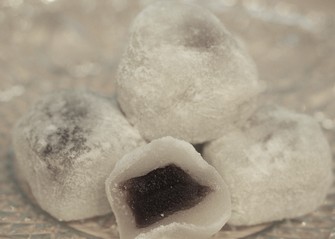
Grilled mochi rice cake (Getty Images)
TOKYO — Can eating “mochi” rice cake and “daifuku” mochi filled with sweet bean paste help you avoid the restroom?
Recently, a curious piece of advice has been circulating on social media as a “life hack”: eating mochi or daifuku to help you avoid frequent restroom visits. This tip suggests that consuming these traditional Japanese foods before long tests, movies or concerts could be a bathroom strategy.
February is the peak of exam season in Japan, and many students might be tempted to try this method. But is there any truth to it?
A temporary solution

Kagurazaka Urology Clinic Director, Dr. Yasuto Muromiya is seen in this photo provided by the individual.
“There is a possibility that eating mochi or daifuku can temporarily reduce urine output,” says Dr. Yasuto Muromiya, the director of Kagurazaka Urology Clinic in Tokyo’s Shinjuku Ward.
Carbohydrates and sugary foods, when consumed, bind with water in the body. This can lead to temporary water retention, thereby reducing urine output. “Food contains water, and mochi and daifuku have relatively low water content but are high in carbohydrates. This might provide some effectiveness as a bathroom strategy,” Muromiya explains.
Beware of diabetes
However, Muromiya advises caution. “I wouldn’t recommend it,” he points out for two main reasons. First, the effect is limited. “For people who drink a lot of water, this method might not be very effective. Limiting water intake would be more effective.”
The second reason is the potential health risks. “If you end up eating mochi or daifuku every day because you’re worried about the restroom, you might increase the risk of frequent urination,” he warns. But why is that?
“When blood sugar levels remain high, diuretic effects increase. Diabetes is a condition where blood sugar levels stay high because insulin, which normally lowers blood sugar, is insufficient. In diabetes, the body tries to expel sugar through urine to lower blood sugar, leading to frequent urination.”
There are numerous cases where people, troubled by frequent urination, discover they have diabetes after a medical examination. “If your frequent urination is due to diabetes, eating daifuku would be counterproductive. If you’re concerned, please get a health checkup first,” Muromiya advises.
For young, healthy students without urinary issues, trying this method occasionally might be acceptable, he suggests. “If you have a successful experience like, ‘I didn’t need to go to the restroom after eating daifuku,’ there might be a placebo effect. However, making it a habit is dangerous.”
Understanding the root cause of frequent washroom visits

“Daifuku” mochi filled with sweet bean paste (Mainichi/Maki Nakajima)
For those who are anxious about frequent urination and are considering trying daifuku as a last resort, it might be better to investigate the underlying cause. “For people in their 40s or younger, psychological factors are often the culprit,” Muromiya says.
Anxiety from past accidents, like not being able to hold it in, can lead to frequent restroom visits even when unnecessary. Behavioral therapy, such as measuring urine volume with a paper cup and visually confirming “no more will come out,” can be effective.
It’s also important to be mindful of excessive fluid intake. “Recently, some people drink 3 to 4 liters a day for health reasons. Drinking too much can disrupt the body’s mineral balance, causing nausea and swelling. For a person weighing 60 kilograms, less than 2 liters a day, including water from food, is considered appropriate.”
For those over 50, men should be aware of prostate enlargement and women of overactive bladder, both of which can be treated with medication.
Additionally, with the rise of telework, “the environment where you can drink water and use the restroom anytime has reduced the opportunity to hold it in, possibly increasing the number of people with frequent urination,” Muromiya observes. “The bladder expands the more you hold it, allowing it to store more urine. A level of up to eight restroom visits a day, or one every two to three hours, is normal. If you go more frequently, try holding it a bit longer.”
(Japanese original by Maki Nakajima, Digital News Group)


AloJapan.com